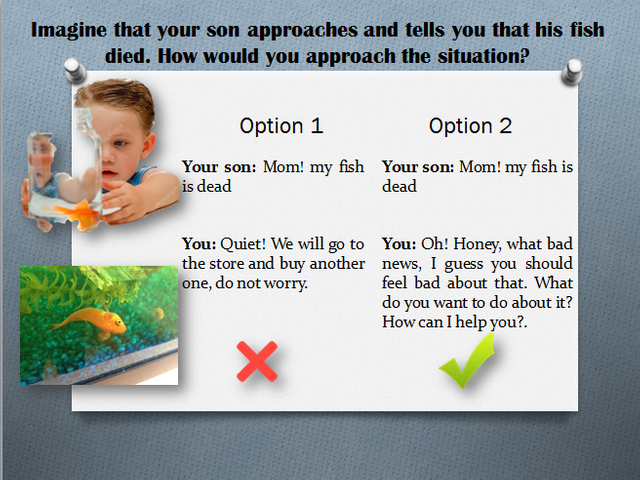Although it hurts to say it: parents are experts in denying the feelings of their children.

Source
The manifestations of feelings begin at an early age and as children get older and know how to express themselves better, conversations tend to rise in tone. Especially because parents get used to literally taking the words of children and do not stop to investigate the feeling that is behind the complaint, this added to the fact that the automatic reaction is the denial of what the person is feeling, is the detonating that generates the conflict.

If you are still not convinced of what I am saying, I will illustrate a series of complaints to which parents are usually accustomed to listening (take the time necessary to process the way you answer them):
| N | What he says your son | What you answer | |
|---|---|---|---|
| 1 | I do not want to go to school | you are going to school because you must learn | |
| 2 | I'm hot | how can you be hot if it's cold | |
| 3 | My brother does not love me | do not be exaggerated, you know that your brother does love you | |
| 4 | I'm bored | because you're bored if you have so many toys, play with some | |
| 5 | you always agree with my brother | do not say foolishness | |
| 6 | I hate vegetables | you must eat them because they are nutritious | |
| 7 | I do not want to go to the music course | you must go because that costs us money |
If the answer to each of these complaints was something like this, let me tell you that in you have denied what your son was feeling.

We know that that children complain constantly, what we want to highlight is the correct way in which you must respond and address the situation with the intention of avoiding conflict.
So! What should we do before the children's complaints?
With the complete and absolute intention of improving the relationship between father and son, we must be aware that the first thing is to achieve effective communication, where both parties can express themselves without disrespect and in which love prevails towards both sides. For this reason you should consider the following:
1.- Apply an empathic language.
2.- Help children cope with their feelings.
Below I will present a situation where you can exemplify the correct and incorrect way to speak empathically and help your child to deal with their feelings. ¡Pay attention please!

Material elaborated by the author of the post taking the images of this Source

As you will see, in the first response option, the mother seeks to solve the problem by ignoring the child's feelings. We are clear that parents seek to protect their children, but evading the child's feelings will not help him to address what he feels, on the contrary it will make him indifferent towards his feelings and the feelings of others.
The response of option 2, however, shows empathy towards the loss of the child's pet, does not seek to replace it immediately, respects their feelings and gives space for the child to decide when it is the best time to have another pet.
We can give you countless examples of how parents usually respond automatically and thus get hooked in a discussion that brings as a background the denial of what is being felt at that time.

As we said in the first paragraphs, as the children get older the conflicts are taking more depth. That is why it is important to channel empathetic communication since they are small, this with the intention that they learn to express what they feel without offending others.


Wonderful advice. Yes, it is important to validate whatever feelings that were felt by our children to establish a healthy form of communication. The sad fact is, it is more difficult than the example given when it comes to identify or to recognise they were actually seeking to feel better or just being a brat. They were kids after all.
I agree with you, the truth is that behind a complaint there is more a feeling than a request. I assure you that many fights would be avoided if, upon hearing the children's complaints, the parents would respond with a:
Ummmm, ok, really? and finish with a hug, that would leave them intrigued :D
To minimize their feelings is always an error. Is very important to recognize their emotions and find the better way to initiate conversations about what is bothering…
It is also important to respond honestly and affectionately and never tell a child (or anyone else) "control yourself”, "not so bad”… I insist! it is always an error. Saying those things can make children think that their feelings do not matter. Regards!
You are right, it is not easy but neither is it impossible to achieve it.
Thank you for your comment.
This is so true @alanasteemit. I got more sensitive with my son's feelings ever since I came across some similar articles. When we go into their shoes, empathy is delivered and most of all, their self esteem is built because we choose to value their feelings. This is very educational and thank you!
If you would like to support the educational community by delegating to @steemiteducation, please click on any of the following links. This will ensure that more teachers are supported on a daily basis.
100SP;200SP;300SP;400SP;500SP;750SP;1000SP;2000SP;3000SP;4000SP;5000SP;10,000SP;25,000SP
Thank youuuuu!!!!
:-)